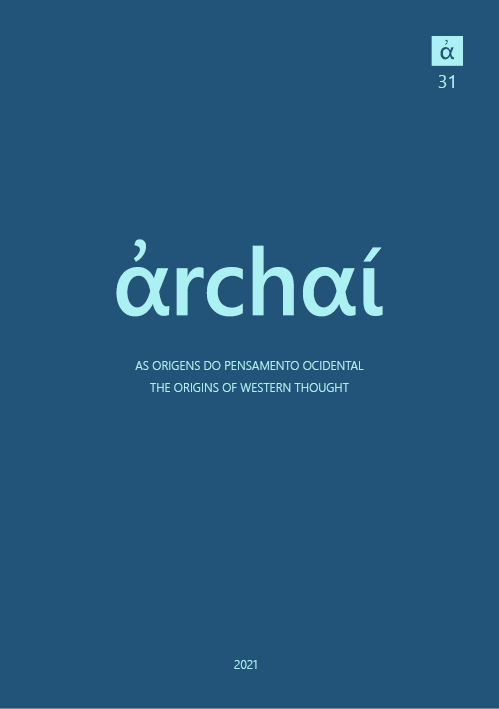Xenophon’s Oeconomicus: the “maîtresse de la maison”
DOI:
https://doi.org/10.14195/1984-249X_31_09Keywords:
oikos, management, wife, companionAbstract
Xenophon’s Oeconomicusincludes an interesting treatise on married life, at the hearth of which is the figure of Ischomachus’ wife, such as she is described by Ischomachus’ words to Socrates. It is an almost innovative figure, because she shares the management of the oikosas being responsible for what is carried out within the oikos: her role is different from her husband’s, who runs and manages what is carried out outside of the oikos. Therefore husband’s and wife’s tasks are different, though complementary. The difference in inclinations and, therefore, roles is shown as established by god, nature (as an instrument of god) and custom (nomos). So Ischomachus’ wife is a collaborator and companion of her husband, even though she does not have an equal relation with her him: she manages the activities and people within the oikosaccording to her husband’s directives. Also in the sphere of sexual life she has to conform to his desires and convictions; her own status as a wife will be preserved only if she meets his expectations: paradoxically her own autonomy is other-directed. Even if she may be considered a “maîtresse de la maison”, nevertheless, as Foucault outlined with a very incisive expression, she is anyway the “maîtresse obéissante de la maison”.Downloads
References
ARRIGONI, G. (1985). Donne e sport nel mondo greco. Religione e società. In: ARRIGONI, G. (ed.). Le donne in Grecia. Roma-Bari, Laterza. p. 55-201.
BEVILACQUA, F. (2002). Senofonte. Anabasi (introduzione generale, nota biografica, nota bibliografica, introduzione all’Anabasi, nota bibliografica, nota critica, traduzione e note). Torino, UTET.
BEVILACQUA, F. (2003). Seduzione e potere nella Ciropedia e nell'Economico di Senofonte. In: BENEDETTI, F.; GRANDOLINI, S. (eds.). Studi di Filologia e tradizione greca in memoria di Aristide Colonna. Napoli, Edizioni Scientifiche Italiane. p. 131-140.
BEVILACQUA, F. (2018a). Kalokagathia e kaloi kagathoi nelle opere socratiche di Senofonte (Memorabili, Economico, Simposio). Magazzino di filosofia 32. p. 5-99.
BEVILACQUA, F. (2018b). Socrates Attitude towards Politics in Xenophon and Plato. In: DANZIG G.; JOHNSON, D.; MORRISON, D. (eds.). Plato and Xenophon. Comparative Studies. Leiden, Brill. p. 461-486.
BRELICH, A. (1969). Paides e parthenoi. Roma, Edizioni dell'Ateneo.
CHANTRAINE, P. (1949). Xénophon. Économique (texte établi et traduit par P. Chantraine). Paris, Les Belles Lettres.
DELEBECQUE, É. (1957) Essai sur la vie de Xénophon, Paris, Klincksieck.
DELEBECQUE, É. (1978). Xénophon. Cyropédie, t. III, (texte établi et traduit par É. Delebecque). Paris, Les Belles Lettres.
FOUCAULT, M. (1984). L'usage des plaisirs. Paris, Gallimard.
NORTH, H. (1966). Sophrosyne. Self-Knowledge and Self-Restraint in Greek Literature. Ithaca (NY), Cornell University Press. POMEROY, S. B. (1984). The Persian King and the Queen Be. American Journal of Ancient History 9, n. 2. p. 98-108. POMEROY, S. B. (1994). Xenophon. Oeconomicus. A Social and Historical Commentary. Oxford, Clarendon Press.
POMEROY, S. B. (2002). Spartan Women. Oxford, Oxford University Press.
ROSCALLA, F. (1991). Senofonte. Economico (introduzione, traduzione e note di F. ROSCALLA con un saggio di D. LANZA). Milano, BUR.
VERNANT, J.-P. (1963). Hestia-Hermès. Sur l'expression religieuse de l'espace chez les Grecs. L'Homme. Revue française d'anthropologie 3, p. 12-50. Ora in VERNANT, J.-P. (1965). Mythe et pensée chez les Grecs. Études de psycologie historique. Paris, Librairie François Maspero. p. 155-201.
Downloads
Published
How to Cite
Issue
Section
License
Copyright (c) 2021 Fiorenza Bevilacqua

This work is licensed under a Creative Commons Attribution 4.0 International License.
Given the public access policy of the journal, the use of the published texts is free, with the obligation of recognizing the original authorship and the first publication in this journal. The authors of the published contributions are entirely and exclusively responsible for their contents.
1. The authors authorize the publication of the article in this journal.
2. The authors guarantee that the contribution is original, and take full responsibility for its content in case of impugnation by third parties.
3. The authors guarantee that the contribution is not under evaluation in another journal.
4. The authors keep the copyright and convey to the journal the right of first publication, the work being licensed under a Creative Commons Attribution License-BY.
5. The authors are allowed and stimulated to publicize and distribute their work on-line after the publication in the journal.
6. The authors of the approved works authorize the journal to distribute their content, after publication, for reproduction in content indexes, virtual libraries and similars.
7. The editors reserve the right to make adjustments to the text and to adequate the article to the editorial rules of the journal.



